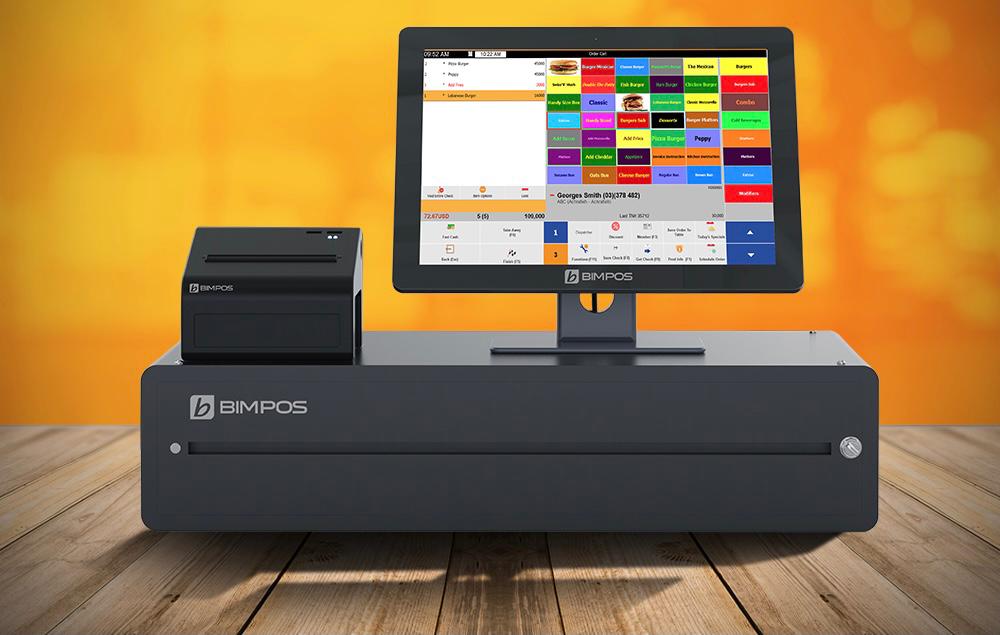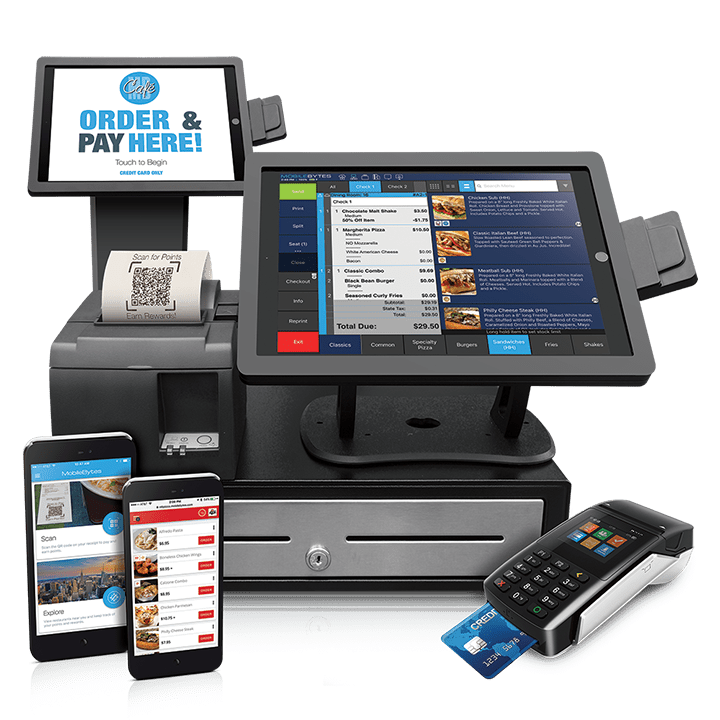The Ultimate Guide To Point Of Sale Software

POS: Retail Point-Of-Sale Solutions Streamline Deals
Pos Machine for Dummies

Hardware Components of a Point of Sale System What makes a POS system tick? It's not simply software application; the hardware plays a starring role. Think about it as the body to the software's brain. Without the ideal hardware, even the most sophisticated POS software is simply a pretty face. Essential POS Hardware So, what are the must-haves? Let's break it down. The central processing system, typically a computer system or tablet, is the heart of the operation. The display or touchscreen show allows personnel to interact with the system. A barcode scanner accelerate the checkout procedure. Keep in mind the days of manually getting in each code? The dependable receipt printer provides consumers with a record of their purchase. A money drawer keeps your cash safe and organized. A card reader allows consumers to pay with credit or debit cards. Diving Deeper: Beyond the Fundamentals But wait, there's more! Depending upon your service, you may need specialized hardware. For example, a dining establishment may incorporate kitchen printers to relay orders, while a retail shop might utilize label printers for item tagging. Ever question how your local bakeshop instantly prints those delicious-looking labels? Picking the Right Hardware: A Balancing Act Picking the best hardware isn't almost buying the most costly equipment. It has to do with finding the sweet area in between performance, resilience, and budget plan. A small service simply starting might select a more basic setup, while a high-volume seller will require robust, high-performance devices. Is it much better to buy new or utilized? Consider your choices thoroughly. A new system provides the most recent innovation and guarantee defense, but a refurbished system can conserve you cash. The Future of POS Hardware read more What does the future hold? Expect to see even more integration with mobile phones, biometric scanners for staff member authentication, and advanced analytics control panels showed on larger, clearer screens. Envision a world where inventory is immediately updated in real-time as items are scanned-- a world where you can track your best-selling item from anywhere in the world. The possibilities are endless, and the hardware is continually progressing to meet the demands these days's companies. Are you prepared to update your point of sale system?
Software Features and Capabilities: The Heart of Your POS System
Ever watch an experienced barista move through a hectic morning rush? Their secret isn't simply caffeine; it's a seamless dance with their POS system. The software is the conductor of your company symphony, orchestrating everything from sales to inventory. However what notes should you be listening for? What abilities genuinely matter in today's market?
Stock Management: Beyond Counting Beans
Forget spreadsheets that haunt your dreams. Modern POS systems provide real-time inventory tracking, notifying you when your stock of artisanal coffee beans dips precariously low. Think about it as a digital guardian angel, avoiding those uncomfortable "Sorry, we're out!" moments to clients. What if you could also forecast demand based upon historic information? Numerous systems now use forecasting tools, an effective weapon versus overstocking and lost sales. This helps prevent the predicament of lacking popular items or collecting excess inventory of slow-moving items, both of which can constrain capital and space.
Sales Reporting and Analytics: Decoding the Data
Sales data is the brand-new gold, and your POS system is the miner. Forget simply knowing just how much you sold today. Dive deep into the information to reveal trends, determine your best-selling products, and comprehend consumer habits. Which menu item pairs perfectly with the day-to-day special? Which promotion resonated most with your clients? These insights are not just fascinating; they're actionable intelligence. Without trustworthy sales reporting, browsing the intricacies of company decision-making ends up being like cruising without a compass, increasing the chance of mistakes and missed chances.
Client Relationship Management (CRM): Structure Bridges, Not Walls
Keeping in mind a regular customer's name and preferred order is lovely, but scaling that personal touch is tricky. POS systems with CRM abilities enable you to track consumer purchase history, choices, and even birthdays. Envision immediately using a discount on their birthday-- a small gesture that fosters commitment and motivates repeat service. But there is the potential snag of poor information quality, which can lead to unreliable client profiles and inadequate marketing efforts.
Payment Processing: Enhancing the Deal
The checkout experience can make or break a sale. Seamless integration with various payment approaches-- charge card, mobile wallets, even copyright-- is non-negotiable. Can your system handle split payments? Does it use safe and secure tokenization to protect consumer data? A clunky payment process resembles hitting a sour note in your business symphony, potentially disrupting the entire performance. Making sure compatibility with evolving payment innovations and adherence to security requirements are vital for maintaining customer trust and operational effectiveness.
Staff Member Management: Keeping the Group in Sync
From clocking in and out to handling approvals and tracking performance, employee management features simplify operations and enhance accountability. Is scheduling a nightmare? Lots of POS systems provide integrated scheduling tools, enhancing staffing levels based on anticipated demand. A typical obstacle that is typically ignored is the obstacle of incorporating worker management functionalities with payroll systems, which can cause mistakes and ineffectiveness in wage calculations.
Advanced Characteristics: Leveling Up Your Operations
- Table Management: Perfect for restaurants, this function allows you to envision your dining-room, track table status, and manage appointments.
- Commitment Programs: Reward your best clients and encourage repeat company with incorporated commitment programs.
- Online Purchasing Integration: Flawlessly incorporate your POS system with online purchasing platforms to expand your reach.
Selecting the ideal POS system has to do with more than simply performance; it's about finding a partner that can grow with your service. Consider your existing needs, expect future development, and don't hesitate to ask the hard concerns. The best software application can transform your business from a disorderly cacophony into an unified masterpiece.
Industry-Specific POS System Applications
Think about the regional bakery, busy with early morning consumers craving fresh croissants. A generic POS system might deal with deals, however can it manage complex dishes, track component inventory, or instantly change production schedules based on sales data? Probably not. That is where the appeal of industry-specific POS systems shines.
Restaurants and Hospitality
For bustling dining establishments, speed and precision are paramount. The number of times have you seen servers handling orders, modifications, and splitting costs, all while attempting to offer outstanding service? A restaurant POS system enhances these procedures, enabling table management, cooking area order tickets, and even online buying integration. These systems often include functions like ingredient-level stock tracking, essential for handling food expenses and minimizing waste. Ever question why your favorite meal is in some cases unavailable? It may originate from a lack of correct stock management.
- Table Management
- Cooking Area Order Tickets
- Online Buying Combination
- Ingredient-Level Inventory Tracking
Retail Solutions
Retail, with its varied stock and customer interactions, demands a different set of tools. Envision a store clothing store having a hard time to keep an eye on sizes, colors, and seasonal collections utilizing a basic checkout system. An industry-specific retail POS system offers functions like barcode scanning, customer commitment programs, and in-depth sales reporting. These systems can even incorporate with e-commerce platforms, offering a smooth omnichannel experience for clients. Did you know some retail POS systems can forecast future sales patterns based upon historic data? Now that is effective!
The Hazards of a Mismatch
Selecting the wrong POS system can produce considerable functional difficulties. A clothing shop using a restaurant POS, for instance, would find it unsuitable for managing inventory with sizes and colors. The lack of proper reporting and analytics might cause misinformed acquiring decisions and lost earnings. The result might be comparable to attempting to fit a square peg in a round hole.
Key Considerations
Choosing an industry-specific POS system needs cautious evaluation. Think of your service's unique requirements and operational workflows. Does the system integrate with existing software? Does it use the needed reporting abilities? Is it scalable to accommodate future development? A well-chosen POS system is not simply a deal tool; it's a tactical property that can drive effectiveness, improve consumer fulfillment, and eventually, increase your bottom line. Keep in mind, it is a financial investment in your business's future, not just a cost.
Security Factors To Consider for Point of Sale Systems
Ever heard the tale of the mom-and-pop store that lost everything due to the fact that of a single, overlooked security flaw in their POS system!.?. !? It's a cautionary tale, and it highlights a vital aspect typically overshadowed by the allure of fancy features and structured operations. The truth is, a POS system is just as great as its security. What excellent is a system that crunches numbers in a flash if it allows crooks to swipe customer's information just as quickly?
The Vulnerability Minefield
The digital landscape is a battlefield. Every POS system, despite size or elegance, is a prospective target. Are you genuinely prepared for the dangers prowling around the corner? The real pinch comes when you discover that your out-of-date software has an open hole that hackers can make use of, turning your service into an unwitting accomplice in identity theft. The trouble is that hackers are crafty and are always altering their techniques.
Common Security Spaces and Professional Tips
- Weak Passwords: "Password123" isn't sufficing. Usage strong, unique passwords for all POS system accounts and change them routinely. Two-factor authentication is a must.
- Unsecured Networks: Your Wi-Fi is like leaving the front door open. Protect your network with strong file encryption (WPA3 if possible) and consider a separate network for your POS system.
- Out-of-date Software: Software suppliers patch security holes all the time. Failing to update is like inviting problem. Set up automatic updates or schedule routine maintenance.
- Worker Training: Your staff is your very first line of defense. Train them to acknowledge phishing attempts, secure passwords, and report suspicious activity.
Information Encryption: Your Guard Versus the Dark Arts
Think of information encryption as a secret code. It scrambles delicate info, like charge card numbers, making it unreadable to unapproved users. Without encryption, your customers' monetary information are like sitting ducks, ripe for the selecting by cybercriminals. It's not practically safeguarding your consumers; it's about securing your credibility and avoiding large fines.
PCI Compliance: The Rulebook You Can't Neglect
If you accept credit cards, you're bound by the Payment Card Industry Data Security Standard (PCI DSS) It's a set of security standards developed to protect cardholder data. Failing to comply can result in fines, penalties, and even the loss of your ability to process charge card payments. It's a headache, yes, but it's a necessary one. Consider PCI compliance as the cost of doing business in the digital age.
Consider this: every transaction processed through your point of sale is a potential entry point for malicious actors. By carrying out robust security measures, you're not just safeguarding your business; you're securing your clients' trust and ensuring the long-lasting viability of your operations. The security of your POS system isn't just a technical concern; it's a business important. It requires constant watchfulness, proactive procedures, and a commitment to remaining ahead of the curve.